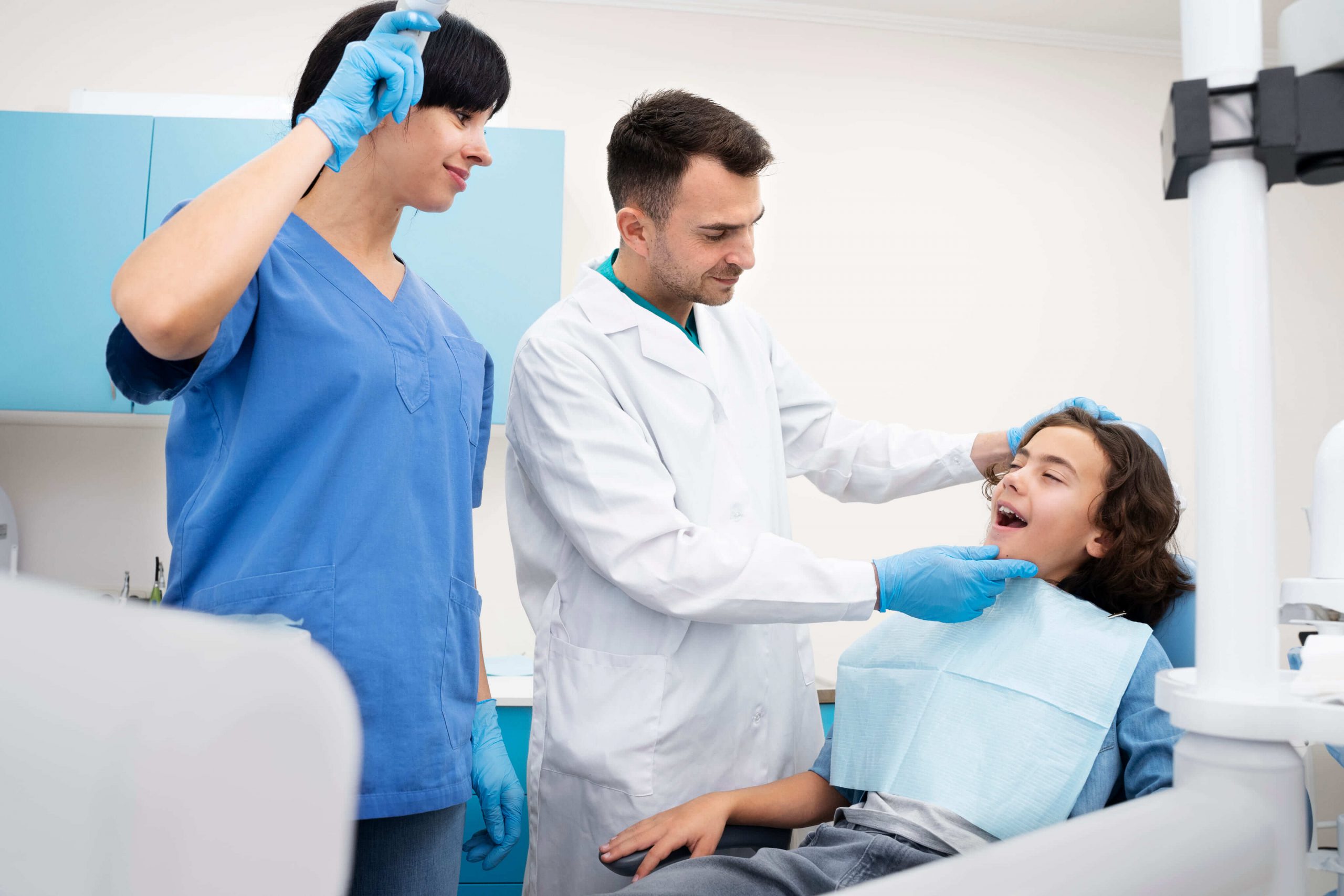
Research has proven that tooth clenching and grinding at night is one of the leading causes of damage to teeth. The extreme pressure and stress placed on teeth is what causes gum recession, periodontal disease and tooth loss. Excessive pressure on the gums during clenching causes the connection between the gums and the teeth to be torn and recede during episodes of teeth clenching.
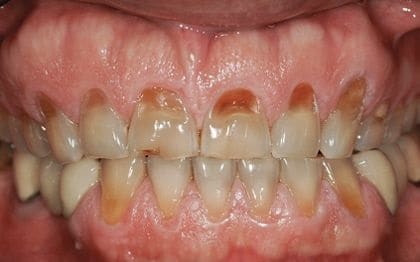
clenching teeth tmj 11
Key points in this article will discuss:
- How teeth clenching causes damage to teeth, gums and periodontal tissues
- How expensive crowns, fillings, implants are secondary to bruxism (clenching)
- Teeth clenching can cause TMJ pain and damage to the bite
- What is the root cause of teeth clenching
- How to stop teeth clenching
Teeth Clenching causes people to need more fillings and crowns
The need for dental work such as fillings, crowns, root canals and dental implants can be caused by teeth clenching. Excessive pressure on teeth causes surface cracks and damage to teeth enamel. Bacteria gets into the cracks and causes cavities and decay. Often the cracks get down to the nerves of the tooth and root canals, extractions and dental implants become necessary.
Contact us for a consultation about how to stop clenching your teeth.

Dr Gary Adams
Gum Recession is caused by Teeth Clenching
Tooth clenching and grinding is also one of the leading causes of gum disease. The gums support the teeth and cover and protect the roots of the teeth. When clenching occurs, the fibers that attach the gums to the roots of the teeth are torn loose and the gums recede leaving the roots of teeth exposed to the mouth. Loss of gum tissue is termed gum recession. The pressure from clenching also causes inflammation between the jaw bone and periodontal ligament. Long term inflammation in gum tissues results in bone loss. Deterioration of the gums leads to root cavities, fillings by the gum line, food trapping in between teeth and ultimately tooth loss. Teeth lost from gum disease can be replaced with implants.
The Root Cause of Teeth Clenching
Teeth clenching is caused by not having enough room and balance in the jaw spaces. Lack of space causes teeth crowding and an uncomfortable and dysfunctional bite. Healthy jaw and teeth alignment provides a position where muscles in the face, jaws, head and neck can rest. We call this a neutral bite. When the bite is crowded and the jaw alignment is poor, people will clench their teeth because the jaw muscles cannot find a comfortable place to rest. It is like trying to get comfortable in a bed or chair that is not ergonomic.
The root cause of teeth clenching during sleep is lack of space in the mouth for the tongue and other muscles to fit and function comfortably. Crowding of the tongue, tonsils and tissues in the throat will block the airway during sleep. Airway/throat blockage will cause poor breathing, oxygenation and sleep disturbances. Sometimes there will be dry-mouth, gasping and even choking. People will respond to this problem by teeth clenching and sleeping on their side. Often times people will not know they are clenching at night because they are asleep.
Sometimes people will have marks on the sides of their tongue called tongue scalloping. The scalloping comes from the tongue between squished up against the teeth. The sleep disturbances can sometimes be as bad as obstructive sleep apnea and airway resistance syndrome.
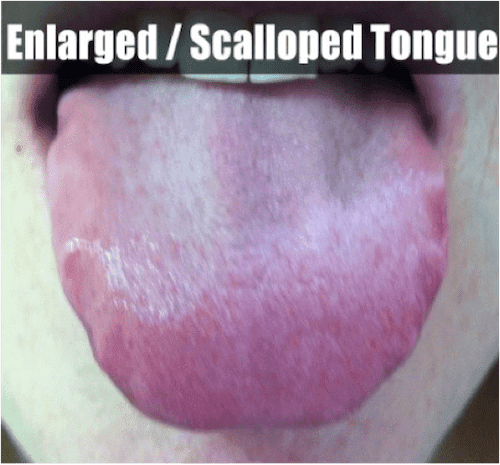
scalloped tongue
Teeth Clenching causes TMJ Symptoms
Overactive chewing muscles and pressure on the teeth, gums and TMJ can cause soreness and pain. Pain and soreness can be present in the gums, teeth, jaw muscles, neck muscles, trap muscles and lower and upper back. Other symptoms such as teeth sensitivity, poor sleep and brain fog are common.
Root Cause and Treatments for Teeth Clenching Video:
Stop Teeth Clenching and Save on Expensive Dental Work
Treatments such as the DNA appliance and Homeoblock device can prevent gum recession and teeth clenching. Eliminating teeth clenching is very important in lower dental care expenses and reducing recurring fillings, crowns and root canals. People who stop clenching save money and spend a lot less time in the dental chair. How to stop clenching and grinding?
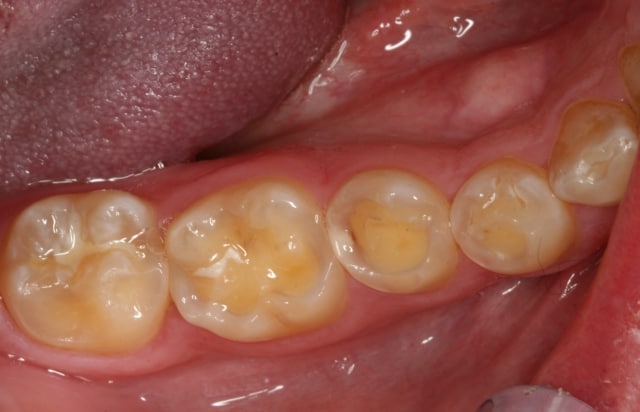
tmj tooth clenching crowns 11
What causes teeth clenching?
The two leading causes of tooth clenching and bruxism are night time airway issues such as upper airway restriction syndrome/obstructive sleep apnea and bite misalignments. Past orthodontics can also play a role in bruxism. Especially in cases where so called extraction-retraction braces have been done. Tooth clenching seems to be related to cases where orthodontics was done for long periods of time and where treatment outcomes were not good. Especially in cases where braces and extractions and retraction were used. If you you clench your teeth, you should be evaluated. There is a strong link between sleep apnea TMJ and a tied tongue.
Expanders can Prevent Kids from Teeth Clenching
Most teeth clenching can be prevented by promoting optimal oral and facial development in kids at a young age. Expanders in kids will stimulate the mouth to grow larger so all the teeth fit and the bite is balanced. Too much focus is on straight teeth and braces and not enough emphasis on the bite, airway and tongue function. Common expanders for kids include the Schwarz Appliance and the ALF Appliance.
Different Kids Expanders Video by Dr. Adams
Lack of Prevention of Teeth Clenching in Dentistry
Most dentists are not trained in diagnosing clenching problems from the standpoint of correcting it. A qualified TMJ expert will diagnose the problems and treat the condition so the teeth grinding habits cease and do not occur anymore. Novel treatments correct the underlying cause of the TMJ problem and do not involve wearing a night guard or other dental TMJ appliance forever. In short, a cure for TMD is possible in many cases and lifetime night guards and clenching should not be accepted.
Sleep Apnea and TMJ Link Video:
How Common is Teeth grinding in US?
40% of the population reports some awareness of clenching their teeth. Experienced dentists say most of their patients are unaware that they clench their teeth during sleep. Recent research shows that clenching and grinding is caused by two things: 1) upper airway restriction syndrome and obstructive sleep apnea 2) a bad misaligned bite.
Teeth Clenching Releases Mercury in Amalgam Fillings
In cases where there are silver fillings, teeth clenching causes mercury gas release from amalgam fillings. It may be best to remove amalgam fillings in a safe way to prevent mercury exposure for the dentist, staff and patient. We use the IAOMT safe protocol to remove amalgam fillings.
How to Remove Mercury Safely in the Dental Office Video
How do dentists diagnose Teeth Grinding?
Your dental health care provider will thoroughly examine your teeth, gums and tongue after taking complete history of stress and anxiety. Following conditions in your mouth will point out towards the diagnosis of teeth grinding and clenching habit.
- Worn teeth with flat grinding surfaces,
- Yellowness of grinding teeth surfaces due to enamel loss and exposure of underlying dentin,
- Sensitivity of teeth to hot and cold on applying air or water jet during examination,
- Fractured or chipped teeth cusps,
- White line can be seen where teeth meet inner side of your cheeks,
- Marks of teeth on the side of tongue sometimes,
- Scalloping of the tongue
- History of braces and tooth removal
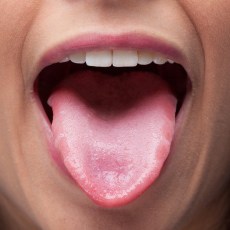
scalloped tongue bruxism
Symptoms associated with teeth grinding and clenching
- TMJ pain and discomfort,
- Severe headache and dizziness,
- Pain in the ear and temples,
- Muscular pain and tenderness in the head and neck area,
- Sleep problems,
- Laziness,
- Tooth wear leading to complex dental treatments failures and eventual tooth loss,
- Sensitive teeth,
- Clicking noises from TMJ,
- Reduced opening of mouth,
- Grinding sound of teeth during sleep,
- Locking of jaws especially during early morning soon after waking up from sleep.
Why teeth grinding or bruxism is damaging to teeth and TMJ?
Bruxism or teeth clenching is an alarming condition and needs to be managed as soon as diagnosed.
- Unchecked grinding of teeth can cause wearing of tooth enamel of all teeth exposing sensitive dentin,
- Pain and discomfort occurs in the start which may goes off when damage becomes extensive as the living pulp is exposed to the environment,
- If no definitive management is performed, eventually teeth will be removed and dental implants will remain the only option for restoration of lost structure and function of your mouth..
Is it safe to place porcelain crowns over damaged teeth during Bruxism?
Metal free and tooth colored cosmetic restorations are popular these days. Advanced dentistry provides pleasing, functional and long lasting porcelain crowns for boosting your smiles and confidence at work. However, these porcelain crowns have the side effect of wearing natural tooth enamel when teeth grinding occurs. Porcelain or ceramic crowns must be avoided if you are suffering from Bruxism or teeth clenching. Zirconia is a much better material choice.
Proper evaluation of oral health conditions involving your TMJ and tooth contacts during function and rest is essential before including these restorations in the treatment. Consult a specialist TMJ dentist in this regard. Furthermore, continuous contact and grinding can result in chipping off and breakage of ceramic crowns due to their brittleness.
Can TMJ disorder develop the habit of teeth grinding?
Yes. Mal-alignment in teeth which develops TMJ pain and discomfort can result in the occurrence of teeth grinding or bruxism.
Management of bruxism involves,
- Treatment of the root cause i.e. stress, anxiety or mal-aligned teeth,
- Custom made and fit night guard fitting your teeth must be worn during sleep hours,
- Jaw exercises,
- Avoid biting and chewing hard foods,
- Relax your face muscles.

 (301) 421 1996
(301) 421 1996 burtonsvillesmiles@gmail.com
burtonsvillesmiles@gmail.com